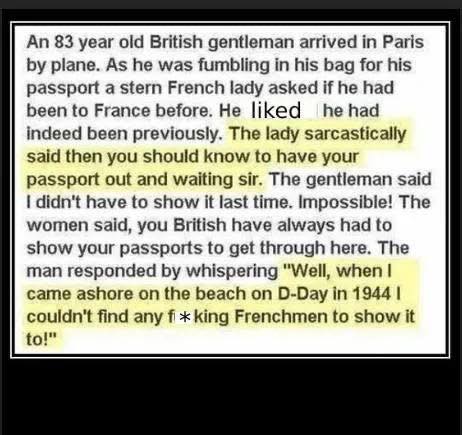
A Quiet Reminder from a Hero in Disguise
At 83 years old, a distinguished British gentleman arrived at a Paris airport. With a steady gait and a well-worn leather bag in hand, he moved through customs like any other traveler. As he fished through his belongings for his passport, a stern-faced French border officer approached him—her expression unreadable, her voice clipped and formal.
“Have you ever been to France before?” she asked, her tone more interrogation than inquiry.
The man looked up, calm and composed, and replied with a simple nod. “Yes, I have.”
Clearly unimpressed, she snapped, “Then you should already know to have your passport ready, sir.”
The gentleman paused, eyes steady, then offered a reply that would shift the air in the room.
“Well,” he said softly, “the last time I came to France, I didn’t need to show it.”
The officer blinked, taken aback. “Impossible. The British have always had to show passports at the French border,” she said, almost scoffing.
The man leaned in slightly, his voice low but firm.
“That may be,” he replied. “But when I came ashore on the beaches of Normandy in 1944, I couldn’t find a single Frenchman to show it to.”
Silence fell like a curtain. A moment of stillness. Of realization. Of quiet respect.
This wasn’t just another elderly traveler fumbling through his bag. He was a veteran—one of the brave souls who had stormed the beaches during the D-Day landings at the age of 18 or 19. A liberator who had risked his life for the freedom of strangers, for the future of a continent.
His words weren’t meant to shame. They weren’t boastful. They were a quiet reminder—of sacrifice, of courage, of history lived rather than read.
Too often, we forget that behind the lined faces of the elderly are stories that shaped the world. That the freedoms we enjoy today were paid for with blood, bravery, and the quiet resolve of men and women who rarely ask for thanks.
This man didn’t need to raise his voice. He didn’t need medals or recognition. His calm dignity said it all. In that moment, he reminded everyone around him that some heroes don’t wear capes—they wear poppies.
In the UK and other Commonwealth nations, the red poppy is more than just a pin—it’s a symbol of remembrance. A tribute to those who fought and fell. To many, it’s just a flower. But to those who understand its meaning, it’s a silent salute to the fallen and to those who still carry the weight of their memories.
So next time you see an elderly person in a queue, on a bench, or passing you by, remember: they might carry more history in their heart than you’ll ever read in books.
And if you wear a poppy, wear it with pride—for men like this British gentleman, who once fought for freedom on foreign shores, and who, with a single sentence, reminded the world what true dignity looks like.